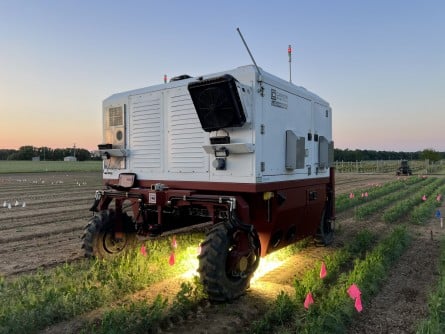Rutgers University scientist Thierry Besançon is pioneering a groundbreaking approach to weed control using lasers, a method that could revolutionize agricultural practices. This innovative technology, currently being tested in New Jersey, employs artificial intelligence to differentiate between crops and weeds, targeting the unwanted plants with precisely focused laser beams.
Besançon, an associate professor in the Department of Plant Biology within the School of Environmental and Biological Sciences, recently led field trials of a high-tech device developed by Carbon Robotics, a Seattle-based company. The trials, which mark the first peer-reviewed study of AI-guided laser weeding on the East Coast, were documented in the research journal Pest Management Science.
Promising Results from Field Trials
In these trials, the laser weeder demonstrated effectiveness comparable to conventional herbicides in controlling weeds. In some instances, the crops even exhibited improved growth. “It’s pure physics,” Besançon explained. “There’s no herbicide involved. It’s just light energy targeting the weeds.”
The research took place at the Rutgers Agricultural Research and Extension Center in Upper Deerfield, near Bridgeton. The experiments focused on crops such as spinach, peas, and beets, essential to New Jersey’s small farms that often lack effective herbicide options.
The trials were conducted in partnership with Dr. Lynn Sosnoskie, an assistant professor at Cornell University. The machine utilized high-resolution cameras and advanced deep learning algorithms to identify crops and weeds in real time, allowing for precise targeting of the weeds without harming the crops.
Expert Opinions and Market Potential
The significance of this research has drawn attention from experts in the field. Stephen O. Duke, a veteran weed scientist at the University of Mississippi, referred to the study as “potentially transformative” in an editorial for Pest Management Science. He emphasized that this technology could be one of the most significant agricultural innovations in decades, likening it to the introduction of glyphosate-resistant crops.
Despite its promise, the technology does face challenges. The initial cost of the laser weeder starts around $500,000, which may deter some farmers. Additionally, the approach is most effective on short-season crops and requires multiple passes throughout the growing season, particularly in the wetter climate of the East Coast where weeds proliferate more rapidly.
One New Jersey grower, interested in purchasing a commercial laser weeder, highlighted the urgency of alternative solutions, stating, “I don’t have any other options.” Besançon noted that the technology not only reduces reliance on chemical herbicides but also addresses the increasing issue of herbicide-resistant weeds, such as Palmer amaranth, which pose significant challenges for farmers.
As the trials continue to evolve, Besançon is optimistic about the future of this laser technology. Improvements are already underway, with plans for faster and more efficient versions of the machine. “Eventually, you might be able to drive the machine at five miles per hour instead of one or two,” he said.
The potential benefits extend beyond efficiency. By minimizing chemical exposure, this method presents a safer option for workers, consumers, and the environment. “We’re talking about our food supply,” Besançon stated. “We need to grow vegetables like peas, beets, and spinach, and we need better ways to control weeds without harming the crops or the planet.”
Besançon admits that working with lasers in agriculture is an unexpected turn in his career. “Ten years ago, I would not have believed it,” he reflected. “But here we are. It’s exciting, and it’s just the beginning.”
The use of AI-guided laser machines is gaining momentum, particularly among farmers on the West Coast, who view this method as an eco-friendly alternative to traditional herbicides. As the technology matures and becomes more affordable, its adoption could significantly alter weed management practices for organic and specialty crop growers across the United States and beyond.







